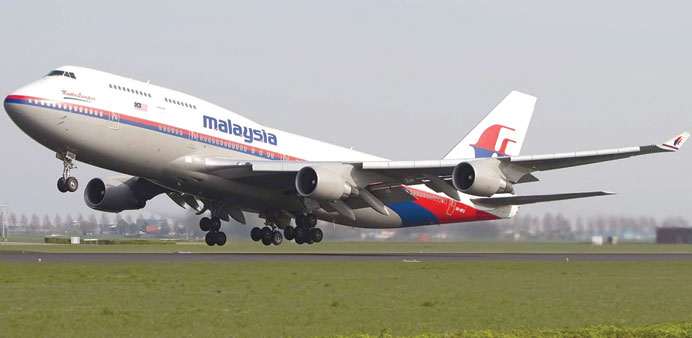The Middle East carriers could benefit from a close partnership with the Malaysian national airline, as they would be able to step in on Mideast-Southeast Asian routes after Malaysian Airlines cuts down its long-haul connections to the Gulf region and beyond, including European cities
By Arno Maierbrugger/Gulf Times Correspondent/Bangkok
The current massive restructuring at troubled Malaysia Airlines could include expanded partnerships or even equity partnerships with Middle East Airlines, namely Qatar Airways and Etihad, according to Australia-based aviation market analyst Center for Aviation, or CAPA.
The centre said that the existing codeshare agreements between the airlines could result into either one buying a stake in Malaysia Airlines, which is about to be delisted from the Kuala Lumpur Stock Exchange and taken under custody of Malaysia’s sovereign wealth fund Khazanah Nasional to proceed with a restructuring plan that includes the layoff of at least 6,000 staff of its almost 20,000 employees and cutting unprofitable routes as part of a $1.9bn overhaul.
Currently, Malaysia Airlines has a codeshare flight with Qatar Airways on the route Kuala Lumpur-Doha. Both airlines are in the Oneworld alliance and are, according to CAPA, talking about an “expanded partnership”.
As for Abu Dhabi’s Etihad, there is a codeshare from Kuala Lumpur to Abu Dhabi and from there to three other destination in the Gulf — Bahrain, Kuwait and Muscat. Both airlines have been discussing a “more comprehensive” partnership which could include Etihad becoming a “strategic partner” of some kind for Malaysia Airlines.
In both cases, the Middle East carriers could benefit from a close partnership with the Malaysian national airline, as they would be able to step in on Middle East-Southeast Asian routes after Malaysian Airlines cuts down its long-haul connections to the Gulf region and beyond, including European cities. Reportedly, talks are also going on with Oneworld members British Airways and Finnair, as well as possibly KLM, to forge closer relationships, which could make Malaysia Airlines even more attractive for Gulf partners on Europe routes.
In the long-haul segment, Malaysia Airlines currently serves Amsterdam, Frankfurt, London, Istanbul, Dubai and Jeddah. Destinations such as Buenos Aires, Los Angeles, New York, Vancouver, Cape Town, Johannesburg, Rome, Vienna, Brussels, Munich, Madrid, Zurich, Stockholm and others have already been terminated. Via Gulf and European airline partnerships some of these connections could be revived on a codeshare basis.
However, much depends on how successful the restructuring of Malaysia Airlines becomes. Apart from axing thousands of jobs, the carrier needs to get a management overhaul but faces resistance from the workers’ union. The programme also has widespread political implications as a lot of government money is flowing into it. Furthermore, fierce competitor AirAisa might seize the opportunity to step in with Middle East or Europe flights with its long-haul arm AirAsia X.
Malaysia Airlines’ financial situation remains grim. In the second quarter of 2014, the company reported $96.5mn in losses and further declining revenue as a result of the two tragedies of flights MH370 and MH17. Chief executive officer Ahmad Jauhari Yahya indicated that “the full financial impact is expected to hit Malaysia Airlines in the second half of the year.”
Between 2001 and 2014, the airline has accumulated some $2.6bn in losses. Counting in earlier restructurings, the Malaysian government has so far pumped $5.4bn into the national carrier in the period, money which Khazanah says could have connected at least 200,000 rural households in Malaysia to water and electricity.

